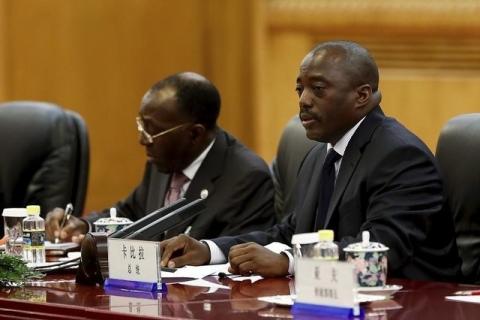Advertisement
Rights abuses likely to undermine Congo poll credibility - UN
KINSHASA (Reuters) - A crackdown on political dissent in Democratic Republic of Congo, including summary executions and arbitrary detentions, is likely to undermine the credibility of upcoming elections, the United Nations said on Tuesday.
The U.N. Joint Human Rights Office (UNJHRO) in Congo said in a report that it had documented 143 human rights violations and at least 649 people arbitrarily detained in connection with the electoral process during the first nine months of 2015.
In a written response, Congo's justice minister, Alexis Thambwe, dismissed the accusations as unsubstantiated and aimed at sabotaging the government's human rights efforts.
Presidential and legislative elections scheduled for November 2016 could mark the central African giant's first peaceful transition of power after decades of autocratic rule and deadly civil conflict following independence in 1960.
But opponents of President Joseph Kabila, who took office in 2001 and won disputed elections in 2006 and 2011, accuse him of trying to hold onto power beyond next year, when he is barred by the constitution from standing for a third term.
UNJHRO said that state authorities have repeatedly tried to intimidate critics of Kabila through the excessive use of force, unlawful detentions and the manipulation of the justice system.
"This trend of restricting freedom of expression and violating the security of those taking a critical stance on the government's actions indicates a shrinking of the democratic space likely to compromise the credibility of the electoral process," the report states.
According to the report, the most serious violations occurred in January, when Africa's leading copper producer was rocked by protests in major cities. Demonstrators were rejecting a proposed revision to the country's electoral code that opponents said was a ploy to delay the election.
UNJHRO said that state agents extrajudicially killed at least 20 people during those protests. Around 400 more were arrested and held in custody beyond the legal time limit.
The report says that election-related abuses declined after January but that there has been a "second wave" of violations since July. Most have been committed by the police and national intelligence service (ANR), which UNJHRO said has illegally held prisoners without access to their families or a lawyer.
It added that the majority of the violations targeted the media, civil society and political opponents, including leading opposition leaders who have organized or participated in political rallies.
Justice Minister Thambwe denied in his response that any arrests of opposition figures have been politically motivated and said UNJHRO's lack of sourcing and failure to identify specific culprits made it impossible for the government to verify other claims in the report.
Kabila has refused to comment publicly on his political future. A spokesman has said that he intends to respect the constitution but allies have recently suggested delaying the election by up to four years to clean up voter rolls.
(Reporting By Aaron Ross; Editing by Joe Bavier and Toby Chopra)



















Add new comment